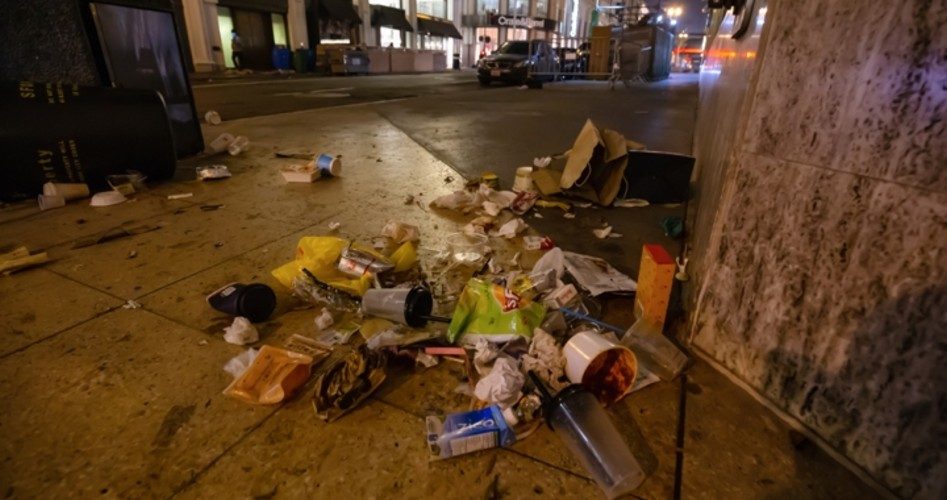
San Francisco’s human feces problem made the woke city the object of richly-deserved ridicule some time ago, but the leftists who run the place don’t seem to care about that … or that turning the streets into an open sewer has become a major health problem.
RentHop, a nationwide website that aggregates vacant rental properties, compiled the latest figures of “poop sightings” and found what one would expect. The City by the Bay reeks. Safely walking the streets of San Francisco requires the nose of a good detective like Mike Stone. Or perhaps “Dirty Harry.”
Feces reports are 7 percent higher so far this year than through the same time period in 2018.
The total: Some 25,000.
The Numbers
Last year, RentHop reported, the city received 28,315 animal/human waste complaints, 35 percent more than 2017.
But as of November 6 this year, the city has received, again, more than 25,000. That’s about 81 per day for each of the 310 days in RentHop’s study. If complaints continue at that rate, the city will get another 5,265 by December 31, which would bring the total to about 30,265.
So for 2019, San Francisco is headed for a 6.9-percent increase from last year’s record-breaking number. That would track with the 7 percent increase through November 7.
Unsurprisingly, the filthiest locales in San Francisco are “in the city center areas of San Francisco,” the website reported. “Tenderloin has been on a winning streak for the ‘poopiest neighborhood’ contest for the past three years.”
The density of complaints in the high-crime neighborhood — feces reports per square mile — are the highest in the city.
• 6,887.9 — 2019
• 7,722.8 — 2018
• 8,644.2 — 2017
If complaints keep piling up at the rate as that cited in RentHop’s analyses, the Tenderloin will have amassed another 1,443 complaints per square mile by year’s end, bringing the total to about 8,331.
Total complaints for that benighted section of the city for 2019 are 2,706. If that rate of 8.73 per day keeps up, the total might reach 3,273 by December 31, a 7.9 percent increase over the 3,034 in 2018.
As well, though complaints are rising, October 2018 was the city’s worst month for complaints since it began keeping records. The total was 3,854, a little more than 12 per day.
In April, Forbes magazine reported that San Francisco, the home of leftist House Speaker Nancy Pelosi, is circling the toilet bowl. Noting that the Bay area boasts “Silicon Valley and its booming economy,” the magazine reported that the “city itself is in trouble.”
Big trouble.
“Today, San Francisco hosts an estimated homeless population of 7,500 people,” the magazine reported. “Affluent sections of the city have become dangerous with open-air drug use, tens of thousands of discarded needles, and, sadly, human feces. Since 2011, there have been at least 118,352 reported instances of human fecal matter on city streets.”
Sounds like a place President Trump might call a s***hole.
No Arrests for Public Urination
Unfazed by the “s*ituation,” as RentHop called it, is the city new top lawman, Chesa Boudin, the son of Weather Underground cop killers.
When he ran to become the city’s district attorney, he announced that enforcing the law against public urination, and presumably, public defecation, isn’t on his list of priorities.
“We will not prosecute cases involving quality-of-life crimes,” the hard-left scion said. “Crimes such as public camping, offering or soliciting sex, public urination, blocking a sidewalk, etc., should not and will not be prosecuted. Many of these crimes are still being prosecuted, we have a long way to go to decriminalize poverty and homelessness.”
Problem is, decriminalizing “poverty and homelessness,” a meaningless left-wing narrative that falsely suggests poverty and homelessness are crimes, does nothing to repair an obvious public health crisis.
Human and animal feces are teeming with dangerous, potentially fatal pathogens. Dried feces creates airborne particles that might carry the rotavirus. And “in Los Angeles,” NPR reported last year, “an outbreak of hepatitis A was linked to the city’s 50,000 homeless people, who sometimes defecate in the streets and spread disease.”
At about 8,000, San Francisco’s homeless population is a fraction of that, but the risk remains the same: spreading killer diseases.
Those who befoul the streets needn’t worry, though. The city’s new top prosecutor won’t press charges for such a minor offense.
Photo: edb3_16/iStock Editorial/Getty Images Plus
R. Cort Kirkwood is a longtime contributor to The New American and a former newspaper editor.


